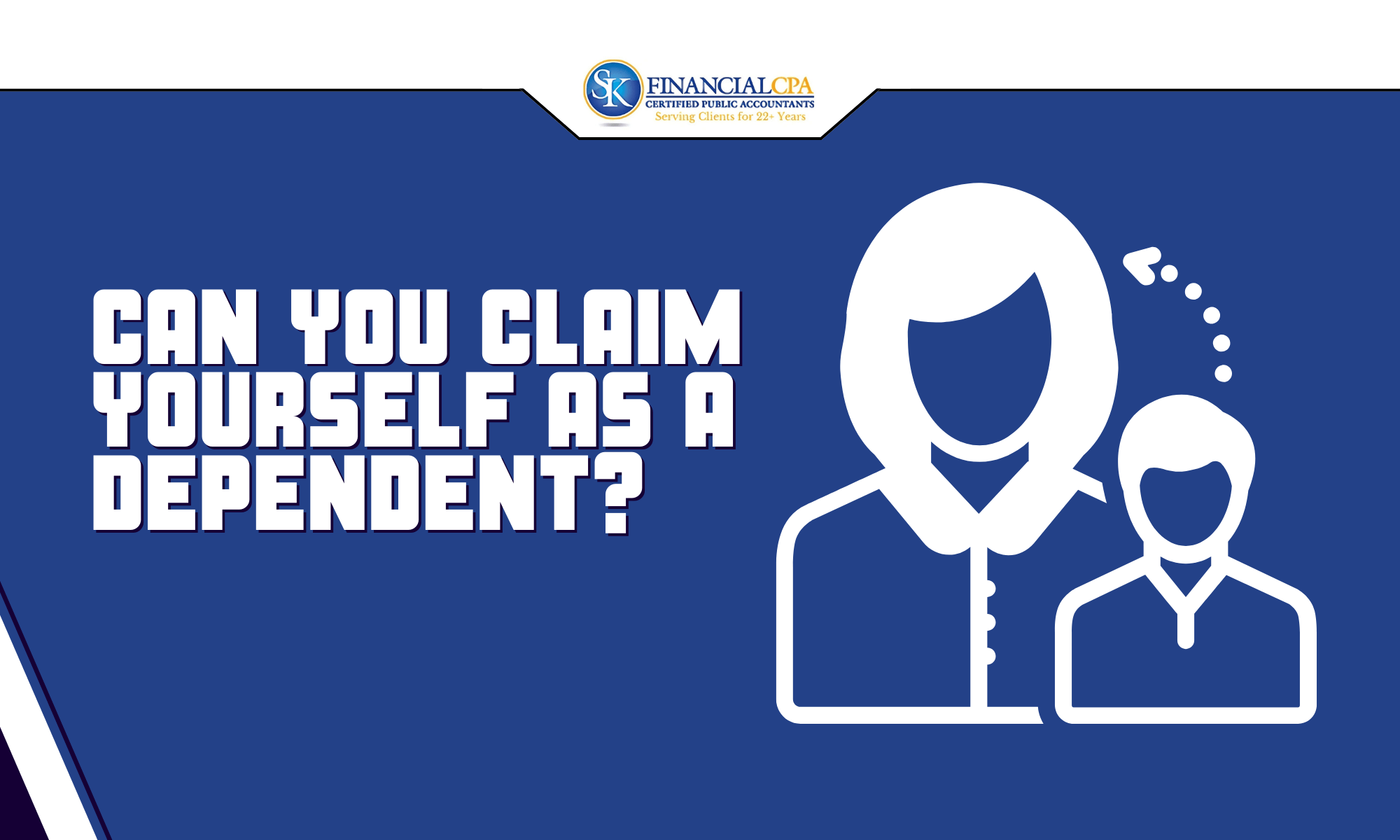
Can You Claim Yourself as a Dependent? What Are the Benefits?
Claiming a dependent on your tax return can result in valuable tax benefits, such as the Child Tax Credit and the Dependent Care Credit. However, in order to claim someone as a dependent, you must meet certain criteria. One common question people often ask is whether they can claim themselves as a dependent.
In this article, we know: can you claim yourself as a dependent? And what are the benefits?
Can you claim yourself as a dependent?
The short answer is no, you cannot claim yourself as a dependent on your tax return. This is because you are considered to have your own personal exemption. In other words, you cannot claim yourself as a dependent because you are already claiming yourself as a personal exemption.
However, there are certain situations where you may be able to claim yourself as a dependent. For example, if you are a college student and your parents provide more than half of your support, you may be able to claim yourself as a dependent on your parents' tax return. Similarly, if you are a single parent and you provide more than half of your own support, you may be able to claim yourself as a dependent on your own tax return.
It's important to note that claiming yourself as a dependent is not an option for most people. If you are unsure whether you qualify as a dependent or whether you can claim someone else as a dependent, it's best to consult with a tax professional or use tax software to help you determine your eligibility.
Criteria for Claiming Yourself as a Dependent?
In addition to the situations mentioned above, there are other specific criteria that must be met in order to claim someone as a dependent on your tax return. These criteria include:
Relationship: The person you are claiming as a dependent must be related to you in one of the following ways: child, parent, sibling, grandparent, or other qualifying relative.
Gross income: The person you are claiming as a dependent must have earned less than $4,300 in gross income for the year.
Support: You must provide more than half of the person's support for the year.
Citizenship or residency: The person you are claiming as a dependent must be a U.S. citizen, U.S. resident alien, U.S. national, or a resident of Canada or Mexico.
If you meet these criteria, you may be able to claim someone as a dependent on your tax return. Keep in mind that you can only claim one personal exemption for yourself, so if you are claiming someone else as a dependent, you cannot also claim a personal exemption for yourself.
Rules for Claiming a Dependent
When it comes to claiming a dependent on your taxes, there are specific rules you must follow. These rules dictate who qualifies as a dependent and determine eligibility for tax benefits such as credits and deductions. Some key criteria include the dependent's relationship to you, their residency, financial support, and their income. Understanding these rules is crucial for accurate tax filing and maximizing potential tax savings.
Tax Benefits of Claiming a Dependent
There are several tax benefits that come with claiming a dependent, including the Child Tax Credit, the Dependent Care Credit, and the Earned Income Tax Credit. The Child Tax Credit provides up to $2,000 per qualifying child, while the Dependent Care Credit can help offset the cost of child care expenses. The Earned Income Tax Credit is a refundable credit that is available to low-income taxpayers who have at least one qualifying child.
Impact on Government Benefits
It's important to note that claiming someone as a dependent on your tax return can also affect their eligibility for certain government benefits, such as Medicaid, Supplemental Nutrition Assistance Program (SNAP), and student financial aid. If you are considering claiming someone as a dependent, it's important to understand how this may impact their eligibility for these benefits.
Required Documentation
In order to claim a dependent, you will need to provide their social security number or taxpayer identification number (TIN) on your tax return. If you are claiming a child as a dependent, you may also need to provide additional documentation, such as a birth certificate or adoption papers.
Special Situations
If you are divorced or separated and you and your ex-spouse both want to claim your child as a dependent, there are specific rules that must be followed. Generally, the parent who has primary custody of the child for the majority of the year is the one who can claim the child as a dependent. However, there are exceptions to this rule, and it's best to consult with a tax professional if you have questions about claiming a dependent in this situation.
Claiming yourself as a dependent is not an option for most people. However, there are certain situations where you may be able to claim yourself as a dependent, such as if you are a college student or a single parent. If you are unsure whether you qualify as a dependent or whether you can claim someone else as a dependent, it's best to consult with a tax professional or use tax software to help you determine your eligibility.
It's also important to note that the tax code regarding dependents can be complicated, and there are many other factors that can impact your tax liability. For example, if you have a dependent with a disability, you may be eligible for additional tax benefits. Additionally, claiming a dependent can impact your filing status, deductions, and credits, so it's important to consider all of these factors when preparing your tax return.
The best way to ensure that you are taking advantage of all available tax benefits is to work with a qualified tax professional. A tax professional can help you navigate the complex tax code and identify opportunities to reduce your tax liability. Additionally, tax software can also be a helpful tool for preparing your tax return and ensuring that you are taking advantage of all available tax benefits.
In summary, while you cannot claim yourself as a dependent on your tax return, there are many other opportunities to claim dependents and reduce your tax liability. Understanding the criteria for claiming dependents and the potential impact on government benefits is important in order to make informed decisions about your tax situation. With the help of a tax professional or tax software, you can maximize your tax benefits and minimize your tax liability.
FAQs
1. What is a dependent for tax purposes?
A dependent for tax purposes is someone who meets certain criteria, such as being related to you, earning less than a certain amount, and receiving more than half of their support from you.
2. Can I claim someone as a dependent if they don't live with me?
It depends on the situation. In general, a dependent must live with you for more than half the year to be claimed on your tax return. However, there are exceptions for certain situations, such as if the dependent is a child of divorced or separated parents.
3. How much is the child tax credit?
The Child Tax Credit provides up to $2,000 per qualifying child. The credit is partially refundable, meaning you may be able to receive a refund even if you don't owe any taxes.
4. What is the Dependent Care Credit?
The Dependent Care Credit is a tax credit that can help offset the cost of childcare expenses. The credit is worth up to $3,000 for one qualifying dependent or up to $6,000 for two or more qualifying dependents.
5. What is the Earned Income Tax Credit?
The Earned Income Tax Credit (EITC) is a refundable tax credit that is available to low-income taxpayers who have earned income from working. The credit amount varies depending on income, filing status, and the number of qualifying children.
6. Can I claim a child as a dependent if they are over 18?
In general, a child must be under the age of 19 or a full-time student under the age of 24 to be claimed as a dependent. However, there are exceptions for certain situations, such as if the child has a disability.
7. Can I claim a relative as a dependent if they don't live with me?
In certain situations, you may be able to claim a relative as a dependent, even if they don't live with you. For example, if you provide more than half of their support and they meet other qualifying criteria, such as income and relationship, you may be able to claim them as a dependent.
8. Can I claim my girlfriend/boyfriend as a dependent?
No, you cannot claim a girlfriend or boyfriend as a dependent on your tax return. To be claimed as a dependent, the person must meet certain criteria, such as being related to you or living with you for more than half the year.
9. Can I claim a dependent if they have their own income?
In general, a dependent cannot have more than a certain amount of gross income for the year in order to be claimed on your tax return. For the 2020 tax year, the limit is $4,300.
10. What documentation do I need to claim a dependent?
To claim a dependent on your tax return, you will need their social security number or taxpayer identification number (TIN). You may also need to provide additional documentation, such as a birth certificate or adoption papers, if you are claiming a child as a dependent.
11. How does claiming a dependent affect my tax liability?
Claiming a dependent on your tax return can reduce your tax liability by providing you with certain tax benefits, such as the Child Tax Credit and the Dependent Care Credit.
12. What happens if two people try to claim the same dependent?
If two people try to claim the same dependent on their tax returns, the IRS will investigate to determine who has the right to claim the dependent. In general, the person who provides more than half of the dependent's support and meets other qualifying criteria will be allowed to claim the dependent.
13. Can I claim a dependent if they are not a U.S. citizen?
In general, a dependent must be a U.S. citizen, U.S. resident alien, U.S. national, or a resident of Canada or Mexico to be claimed on your tax return. However, there are exceptions for certain situations, such as if the dependent is a refugee.
14. Can I claim a foster child as a dependent?
Yes, you can claim a foster child as a dependent on your tax return if they meet certain criteria, such as living with you for more than half the year and receiving more than half of their support from you.
15. Can I claim a deceased person as a dependent?
No, you cannot claim a deceased person as a dependent on your tax return.
16. Can I claim a dependent if they are married and file their own tax return?
In general, a dependent cannot be married and file their own tax return. However, there are exceptions for certain situations, such as if the dependent is filing a separate return only to claim a refund of withheld taxes.
17. Can I claim a dependent if they are a non resident alien?
In general, a nonresident alien cannot be claimed as a dependent on your tax return. However, there are exceptions for certain situations, such as if the nonresident alien is your child and meets certain criteria.
18. Can I claim a dependent if they are in jail or prison?
In general, you cannot claim a dependent who is in jail or prison on your tax return. However, there are exceptions for certain situations, such as if the dependent is temporarily absent from home due to illness or education.
19. Can I claim a dependent if they are my parents?
Yes, you can claim a parent as a dependent on your tax return if they meet certain criteria, such as receiving more than half of their support from you and having gross income less than the exemption amount.
20. Can I claim a dependent if they are my sibling?
Yes, you can claim a sibling as a dependent on your tax return if they meet certain criteria, such as living with you for more than half the year and receiving more than half of their support from you.
Follow SKFinancial on Facebook / Twitter / Linkedin / Youtube for updates.








